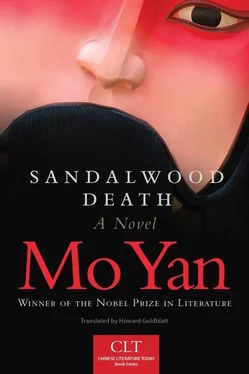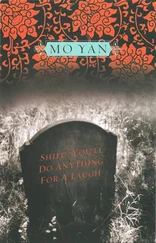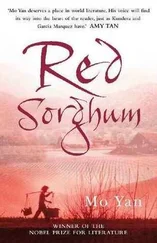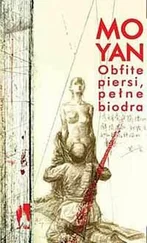Excellency Wang then ordered that a second condemned prisoner be brought over for us to practice on. The head of this particular man was the size of a willow basket, almost too big for the hoop, which we struggled to affix to his head, inept like coopers, greatly displeasing His Excellency.
“That little toy is what I get for two hundred ounces of silver?”
Sweat oozed from my pores at his comment. But Grandma Yu appeared not to let it bother him, although he later told me he was quaking from fear. Our performance this time was a distinct improvement, as we drew it out for a full two hours, inflicting untold anguish on the pitiful man with the big head before he died. That earned a smile from His Excellency. With an eye on the two corpses laid out in the center of the audience hall, he said:
“Go ahead, get everything ready. Replace the bloodstained leather straps, clean the hoop, and add a coat of varnish. Be sure to clean the garments you plan to wear, so His Majesty and His court followers will see that the executioners attached to the Board of Punishments are a refined lot. There may be many ways of putting it, but in simplest terms, only success matters. You will not fail! If there is the slightest flaw in your performance, casting the Board in a poor light, you will experience Yama’s Hoop from a more personal angle.”
We rose at second cockcrow the next morning and set to making our preparations. Our minds were filled with the gravity of performing a palace execution, making sleep impossible. Even Grandma Yu, who had weathered many storms, tossed and turned all night, getting out of bed every hour or so to take the urinal down from the windowsill and empty his bladder, then sitting down to smoke. Second and Third Aunts busied themselves lighting the stove and preparing breakfast, while I concentrated on subjecting Yama’s Hoop to a meticulous inspection. After convincing myself that it was in flawless condition, I handed it to Grandma Yu for one final inspection. He rubbed his hand over every inch of the device, nodded his approval, and wrapped it in a three-foot length of red silk before reverently laying it on the Patriarch’s altar. The Patriarch of our profession is Gao Tao, a sagely eminence from the period of the Three Kings and Five Emperors, who nearly succeeded the legendary Yu on the Imperial Throne. Many of the punishments in use and the penal codes honored today originated with him. My shifu told me that our Patriarch needed no knife to dispatch a victim—by staring at the victim’s neck and slowly rolling his eyes, he could make the man’s head fall to the ground on its own. Ancestor Gao Tao had phoenix eyes, brows like reclining silkworms, a face the color of a jujube, eyes as bright as stars, and three handsome tufts of whiskers on his chin. He bore an uncanny resemblance to the warrior Guan Gong of the Three Kingdoms period. “The truth is,” Grandma Yu said, “Guan Gong was a reincarnation of Gao Tao.”
Following a hurried breakfast, we rinsed our mouths, cleaned our teeth, and washed our faces. Second and Third Aunts helped us into our new court attire and placed red felt caps on our heads.
“Shifu, Elder Apprentice, you look like bridegrooms,” Third Aunt complimented us.
Grandma Yu gave him a stern look, showing his displeasure with the comment. One of the conventions of our profession is a proscription against silly or foolish words before or during an execution. Any violation of that taboo can summon the ghosts of wronged victims or evil spirits. You often see little spinning dust devils in the marketplace. What do you think they are? They are caused not by wind, but by the spirits of those who were put to death unjustly.
Grandma Yu took a bundle of prized sandalwood incense from a willow case, gently extracted three sticks, lit them from the flickering candle on the Patriarch’s altar, and inserted them into the incense burner. He went down on his knees, followed hastily by his three assistants. Grandma began muttering softly:
“Patriarch, Patriarch, today we will carry out our task in the palace, with enormous consequences. Your offspring ask for your protection and guidance in the proper performance of our duties, and for that we kowtow to you.”
Grandma Yu banged his head loudly against the brick floor. We did the same. Our Patriarch’s face glowed red in the candlelight. Altogether we each kowtowed nine times before standing up, starting with Grandma Yu, and stepping back three paces. Second Aunt went outside to fetch a celadon bowl; Third Aunt went outside and returned with a white rooster with a black comb. Second Aunt placed the bowl in front of the Patriarch’s altar and stepped aside, going down on his knees. Third Aunt knelt directly in front of the altar and held the rooster by the neck with one hand and by the feet with the other, stretching it out horizontal. Second Aunt then took a dagger out of the bowl and neatly sliced the rooster’s neck. For a moment no blood appeared—our hearts nearly stopped, for killing a rooster and drawing no blood augured a botched execution. But then the blood—so red it was almost black—spurted from the wound and into the bowl. Blood surges through the veins of roosters with white feathers and black combs, and killing one before an execution is for us an essential ritual. Once all the blood had drained out of the rooster, the two aunts placed the bowl on the altar, kowtowed again, and backed away, bent at the waist. Grandma Yu and I stepped forward, fell to our knees, and kowtowed three times. Then I followed his lead by sticking the first two fingers of my left hand into the bowl and painting my face with the rooster’s blood, like an actor applying stage paint. The warm blood made the tips of my fingers tingle. There was enough to paint both our faces, and a bit left over to turn all four hands red. Now our faces, mine and Grandma Yu’s, were the same color as the face of the Patriarch. Why had we used rooster blood? To unite us with the Patriarch, but also to notify those spirits of the wrongly executed and evil spirits that we were descendants of Master Gao Tao, and that when we put someone to death, we were gods, not humans. We were the law of the land. With our hands and faces painted red, Grandma Yu and I sat peacefully on stools to await the official summons from the Imperial Palace.
As the red sun wheeled into the sky, crows in scholar trees set up a racket of caws. A woman was keening in the Imperial Dungeon. Condemned to die for killing her husband, she keened like that every day—for heaven, for earth, and for her children. By now she had descended into madness. Your dieh, I, being young, soon began to fidget and could not sit still. I stole a glance at Grandma Yu, who sat straight and unmoving as an iron bell, and I followed his lead by holding my breath to calm myself. The blood-paint had dried and become stiff, turning our faces into something resembling sugarcoated berries, and I strained to experience the feeling of armor covering my skin. Little by little my thoughts blurred, and a hazy picture formed in my mind of me following Grandma Yu down a deep, dark trench, walking on and on without ever reaching the end.
The Office of Palace Justice Director, Eminence Cao, led us up to a pair of small, blue-curtained palanquins and gestured for us to climb in. This sudden and unexpected indulgence nearly unnerved me, for I had never ridden in a palanquin before. I glanced at Grandma Yu, who, to my surprise, stood without moving, open-mouthed, as if he were about to cry or sneeze. A eunuch with a double chin standing beside the palanquins said in a throaty voice:
“What’s the matter, chairs too small for you?”
Still, neither Grandma Yu nor I was willing to climb in. Our eyes were fixed on Eminence Cao, who said:
“These are not intended as a show of respect, but to keep you from attracting too much attention. What are you waiting for? Get in! It is true, you cannot put a dog’s head on a golden platter.”
Читать дальше












